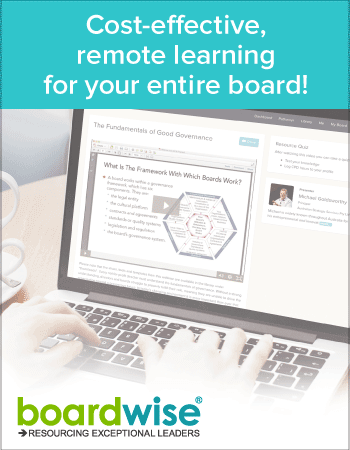leadership
The Discipline in Developing a Winning Culture
Published: February 14, 2021
Read Time: 6 minutes

Culture is the buzzword of current day governance. A panacea for underperformance, inefficiency and conduct risk. Boards and executives are tasked with developing the right culture in their organisation. But we need to talk about what this means in practice for directors.
There is increasing expectation that directors will get out and ‘kick the tyres’ to develop greater understanding of their organisation and its culture, empowering more active and meaningful leadership ‘from the top’ by boards. Yet, boards are also advised to keep their ‘noses in and their fingers out’ of day-to-day management. So, how do boards best walk the delicate line between oversight of culture and overstretch in practice?
The simple answer is – no one size fits all. Boards and management teams are well advised to discuss and workshop their relative roles and the information flow between them to become better aligned in dealing with challenges in culture. Discussing and agreeing the best approach for your organisation enhances a united focus and connection.
Peggy O’Neal, President of the Richmond Football Club, knows all about the power of culture built upon strong governance. In 2017 the Richmond Football Club won its first AFL Premiership in 37 years, after finishing 13th on the ladder in 2016, going on to win a further Premiership in 2019. Strong culture, governance and teamwork, along with an unwavering focus on a singular purpose, have all been credited as crucial to this long-awaited success. The board’s leadership through governance, financial and off-field challenges has been recognised as providing many lessons for a broad range of organisations seeking to achieve their strategic objectives.
I tackled the challenge of culture with Peggy, the first female President of an AFL football club, over social distance and she generously shared her reflections from the heart of Tigerland.
Let’s start with the basics, how do you define culture?
Peggy simply and powerfully states ‘governance is culture’, essentially it is ‘the way you do things’. This concept has become increasingly evident to Peggy over her many years’ experience on boards.
This is a truly powerful reflection – this thinking empowers each board to understand the impact it can have on the culture of its organisation. Governance is more than just frameworks and policies but, as Peggy reflects, the way decisions are made.
So, boards should take the time to reflect on their role in governance and culture. And ask themselves, does our board ensure it has the right information to make decisions? Does it respect and hear all views? Does it place the right emphasis and time on the things that really matter to our organisation and convey value in doing things the right way?
How do you develop a strong culture?
Notably, Peggy reflects on the importance of the board and the executive working together; it is not ‘us and them’. Trust is crucial.
In building and maintaining trust it is important to think about how the board and executive team are going to work together. Peggy advocates merit in developing a framework reference tool for responsibilities and emphasises that all organisations need to ‘cut the cloth to what fits’.
Flexibility is important too, Peggy stresses, as well demonstrated by the many boards undertaking more regular briefing sessions in response to COVID-19, to ensure that all directors are fully informed, providing appropriate support to executives and remain capable of making timely decisions as required.
Boards need to take account of the requirements of their Constitution and may consider formal delegations to their CEO. A NFP organisation with limited resources may agree that the board play a greater advisory role with particular responsibilities based on the range of skills of directors.
What are your tips for getting insight into the culture of an organisation as a director?
Peggy emphasises the importance of trust between the Chair, the board and the CEO as crucial to good governance.
As a board you must hold your CEO accountable. But Peggy also warns that it is important for a board not to undermine its CEO. Directors should generally deal with executives through the CEO, keeping the Chair in the loop.
Boards should consider developing a Code of Conduct for the rules of engagement between the board and executives, with simple rules about how to work together, to ensure the maintenance of deep trust.
CEOs should adopt the often-quoted ‘no surprises’ approach to communication with the board. Non-executive directors cannot possibly know all that happens in an organisation, so getting the information flow right is crucial.
Boards may agree to formalise some reporting guidelines to ensure adequate and appropriate reporting.
Boards remain responsible for ensuring they receive targeted and appropriate reporting.
How does a board lead the culture and avoid stepping on the toes of management?
Boards must remain mindful of not interfering with the role of management. Peggy warns that a ‘whisper in the boardroom can become a hurricane down the corridor’. Peggy quotes a simple example of a director casually questioning an executive as to whether a particular budget has been fully utilised, may lead to unnecessary fear that budgets are about to be cut by the board.
For this reason, it is important for the board to support the CEO and for individual directors to ensure personal communications are not confused as representations by the board.
Peggy emphasises boards should determine, and maintain, appropriate channels of information. Agreeing and formalising the role of directors and executives, and the interaction between them, assists with role clarity and forging strong connections and trust.
Individual directors too should always remain mindful that they are part of a collective decision-making body and caution must be exercised when they are dealing with employees of the organisation.
From a governance perspective, it all comes back to role clarity, trust and an appropriate flow of information. The challenge for boards is to be effective in holding management accountable for culture, without micro-managing or overburdening executives with reporting requirements. Collectively committing to clear roles and information flows as a board and executive team can lead to a winning connection in practice.
With thanks to Peggy O’Neal for her insightful and generous reflections. Peggy is an experienced board director and President of the Richmond Football Club. In the NFP sector, she is on the board of Women’s Housing, the investment advisory panel of Home for Homes and an ambassador for Opportunity International. She has been named one of the Financial Review/Westpac 100 Women of Influence and one of Women’s Weekly 50 Most Powerful Women in Australia.
This article was first published in the Better Boards Conference magazine, July 2020
Share this Article
Recommended Reading
Recommended Viewing
Author
-
Consultant & Facilitator
Beth McConnell Consulting
- About
-
Beth McConnell is passionate about improving the way boards and teams work together, providing practical guidance to boards, directors and executive teams to empower them to achieve their organisation’s strategic goals.
Beth provides a range of services to boards, including board reviews, board training, tailored workshops, facilitation and coaching – bridging the gap between theory and practice. Beth focuses on improving the way boards and executive teams work together, to empower them to achieve their organisation’s strategic goals. Beth is an experienced corporate governance adviser having worked in management consulting specialising in governance, leading corporate law firms and in-house with superannuation funds.
Beth has over 25 years’ experience as a solicitor and a consultant specialising in corporate, trust and superannuation law and corporate governance. At the time of writing, Beth sits on the Superannuation Complaints Tribunal, the boards of CatholicCare and Xavier College and as Independent Consultant to the Audit, Risk and Compliance Committee of UniSuper. Beth is also a Panel Member on the Australian Financial Complaints Authority.
Beth has a Bachelor of Commerce, a Bachelor of Laws (Hons) and a Master of Commercial Law from The University of Melbourne. Beth is a Graduate of the Australian Institute of Company Directors and trained at the Institute of Executive Coaching and Leadership.
Found this article useful or informative?
Join 5,000+ not-for-profit & for-purpose directors receiving the latest insights on governance and leadership.
Receive a free e-book on improving your board decisions when you subscribe.
Unsubscribe anytime. We care about your privacy - read our Privacy Policy .










